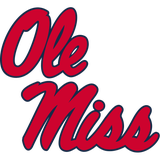
Ole Miss coach Hugh Freeze likely won't survive this NCAA violations scandal
In light of Wednesday’s news that Ole Miss has banned itself from the 2017 postseason upon receiving new allegations of NCAA violations, the easiest question to answer is whether Rebels coach Hugh Freeze will survive his program’s ongoing scandal.
He most certainly won’t.
The far murkier and intriguing topic of debate as this story continues to unfold is whether Freeze is the villainous cheater so many have long believed — and for whom Wednesday’s news becomes their ultimate confirmation — or a sympathetic figure who would have you believe he's become an unwitting participant in his own downfall.
The NCAA is now hitting Ole Miss with the dreaded lack of institutional control charge after adding eight new violations on top of the 13 previously alleged against the Rebels. Most headline-grabbing of those is an accusation that a former staff member put a former recruit in touch with two boosters who provided “between $13,000 and $15,600” in impermissible cash benefits.
That’s some straight-up old-fashioned cheating right there. Sadly for Ole Miss, it got caught paying for a kid who then signed somewhere else.
Freeze is charged with violating “head coach responsibility legislation” due to the misdeeds of his assistants. He retains the full support — for now — of Chancellor Jeff Vitter and AD Ross Bjork, who plan to contest the charge against Freeze.
But c’mon. Let’s be real here.

Only a Hall of Fame basketball coach (Jim Boeheim, Rick Pitino) survives allegations like these on his watch. Over the years, football icons from Auburn’s Pat Dye to Ohio State's Jim Tressel learned they couldn't outlast extra benefits scandals.
What hope does one-time Sugar Bowl champion Hugh Freeze hold? Especially coming off a 5-7 stinker in 2016 and entering what will now be another lost season in 2017.
It’s only a matter of whether Ole Miss waits out the still-impending Committee on Infractions hearing and subsequent final verdict later this year.
Knowing all that, there won’t likely be too many sympathetic parties outside of Oxford if and when Ole Miss sends its $5 million-a-year coach with his 39-25 record packing. But perhaps there should be. Because whether or not you believe him, Freeze continues to not only maintain his innocence but holds himself up as a paragon of rules compliance — seemingly with complete earnestness.
“From the moment I arrived in December 2011, I have emphasized to all of my staff that our program is founded on certain core values — faith, attitude, mental toughness, integrity and love,” Freeze said in the school’s self-published (and, honestly, a bit creepy) video statement. “Integrity — doing things the right way. I am extremely disappointed to learn that any member of my staff violated any SEC or NCAA rules, and as the head coach, I regret those actions. Any behavior by my staff that is inconsistent with that commitment to do things the right way simply does not reflect the emphasis I personally place on NCAA compliance.”
It’s language all-too familiar with those who’ve followed the now four-year-long investigation into Freeze’s program. One that Freeze himself all but openly invited with an infamous tweet.
In February 2013, Freeze felt compelled to defend himself and his program against ever-swirling rumblings that his star-studded recruiting class that year (one that included future first-rounders Laremy Tunsil, Laquon Treadwell and Robert Nkemdiche) was too good to be true.
“If you have facts about a violation, send it to compliance@olemiss.edu,” Freeze tweeted. “If not, please do not slander these young men or insult their family.”
At some point shortly thereafter the NCAA took him up on his offer.

Four years later here we are, with Freeze’s program accused of 21 NCAA violations, including lack of institutional control. And four years later, Freeze is still objecting to those insidious characterizations.
“Contrary to the allegations, I have demonstrated throughout this entire process that I have a strong record of promoting compliance and monitoring my staff,” he said in his statement, “and I look forward to presenting that evidence to the Committee on Infractions.”
For the NCAA’s purposes, it doesn’t particularly matter whether Freeze knew all or nothing of the events taking place inside his program. It made clear upon revising its penalty structure several years ago that a head coach is responsible for rules violations by his staff members. And in this case, there are just so many of them.
In addition to coordinating the aforementioned booster payments to “Prospective Student-Athlete B,” the same staff member arranged $2,272 worth of impermissible lodging and transportation for that and another prospect. Another staff member arranged for some recruits to receive $2,800 worth of memorabilia from a booster-owned store. All are deemed the most serious, Level 1 allegations.
And that’s on top of all the stuff the enforcement staff previously alleged last year before Tunsil’s draft-night debacle reopened the entire case.
Freeze led Ole Miss to no shortage of on-field glory during his five seasons in Oxford. He led the long-irrelevant program to consecutive New Year’s Six bowls in 2014 and ’15 and corresponding stints in the Top 10. He twice beat Nick Saban’s Alabama juggernaut. These were unquestionably glorious moments for long-suffering Rebels fans.
But the specter of NCAA sanctions long simmered beneath the surface. It was one thing when they appeared to be relatively minor and lacking the teeth to merit a serious punishment. Now that there’s a postseason ban and five-figure booster payments on the table, the rules-breaking is well on its way to supplanting those Alabama wins as the heart of Freeze’s legacy.
Is that fair? He’d certainly say not. But given he dared the world to provide proof of cheating in his program, and the world subsequently turned up 21 violations, he’s really got no one to blame for this but himself.
And apparently the NCAA agrees.





































































































































